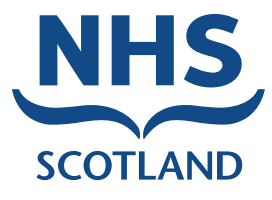International Nurses Day – Celebrating our incredible nurses
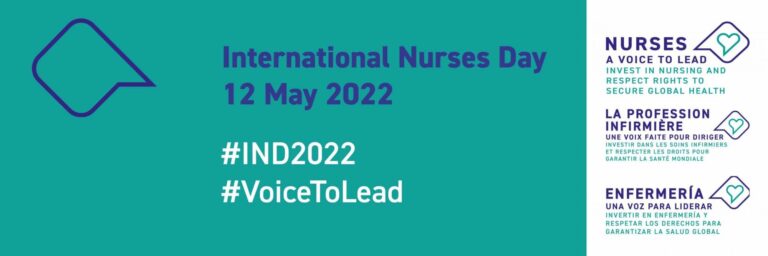
On International Nurses Day we celebrate all nurses and the diverse range of services they provide for patients. Many people will see a nurse for blood tests or vaccinations, but did you know that they can provide a whole range of services, including healthy lifestyles advice, long term condition management, and prescribing medication? You might think you need to be seen by a GP, but your needs could be met by a nurse working in your GP surgery.
Across our OneMedical Group sites, we have 76 nurses who help to care for the 2,000 patients that come through our doors each and every week. This includes Nursing Associates, General Practice Nurses, and Advanced Nurse Practitioners. In this article, we’ll focus on these 3 nurse roles, and what each one does.
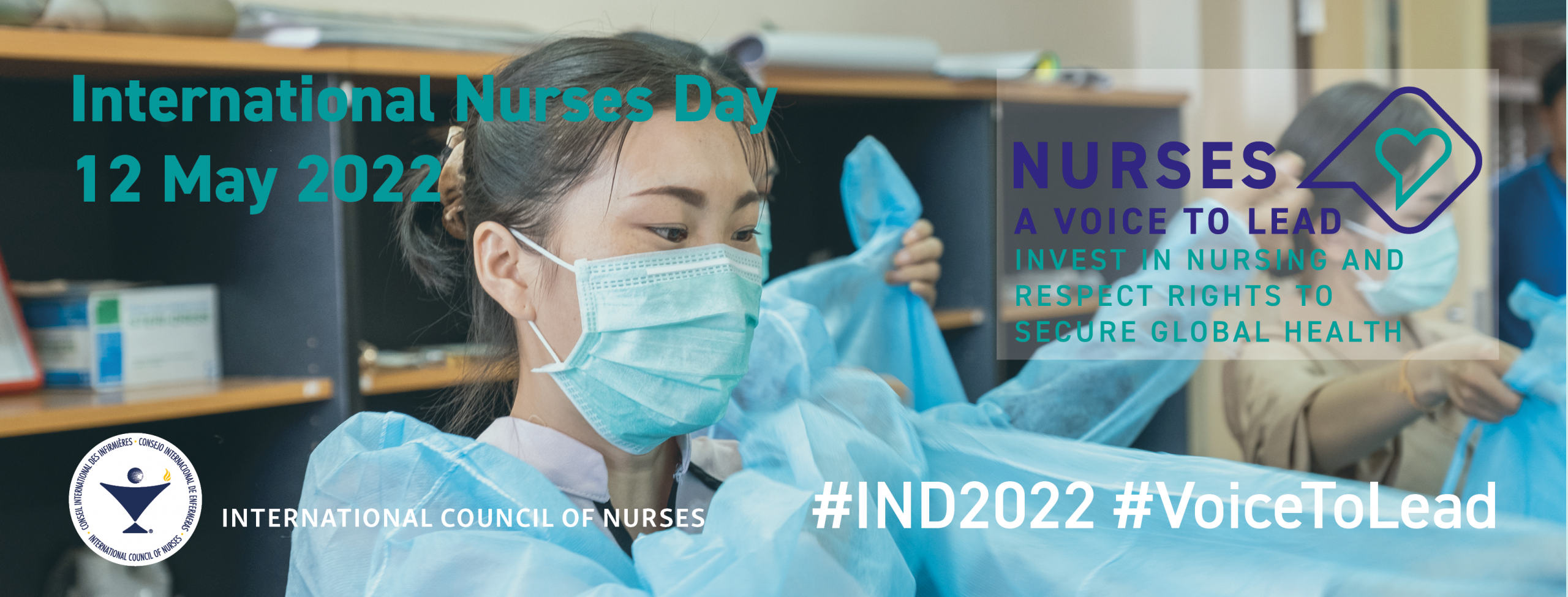
Nursing Associates
Nursing Associate is a new role, which is a stepping stone for individuals to move from a Healthcare Support Worker role to become a registered nurse. Nursing Associates work across all four fields of nursing: adult, children’s, mental health, and learning disability.
Did you know… Nursing associates can give advice about healthy lifestyles, and support you and your family through difficult diagnoses?
A nursing associate will complete two years of training, including classroom learning and hands-on experience in the workplace. They are qualified with a foundation degree. At a GP surgery, nursing associates perform a range of services including:
• Taking blood samples
• Carrying out electrocardiograms (ECGs) to check heart rhythm
• Height, weight, and BMI checks
• Lifestyle advice
• Blood pressure checks
• Wound care
• Measuring and interpreting blood glucose levels
• Effectively sharing information and checking understanding about long term conditions
• Supporting patients and their families through unwelcome news and lifechanging diagnoses
Amber Harrison works as a Nursing Associate at The Light Surgery in Leeds. She was inspired to become a Nursing Associate after seeing her mum studying nursing and midwifery at university when she was a child: “My role gets confused a lot with healthcare assistant. Although I don’t mind, it would benefit a lot of people to know the difference, so they can get booked in with the right person first time.”
General Practice Nurse
Most people have had an appointment with a General Practice Nurse at some point. General Practice Nurses are involved in many aspects of patient care, including:
• Minor and complex wound management including leg ulcers
• Travel health advice and vaccinations
• Child immunisations and advice
• Women’s health including cervical screening
• Men’s health screening
• Sexual health services and contraception
• Supporting people to stop smoking
• Long term condition screening and management
• Health promotion and healthy lifestyles advice
Did you know… that General Practice Nurses usually lead on long term condition management within GP surgeries?
Long term condition management is a crucial part of a General Practice Nurse’s duties, including asthma, heart disease, and diabetes clinics. Margaret Sykes, Practice Nurse at Westgate Surgery, chose nursing so she could work with a variety of patients in a wide range of clinical settings and locations. “Every day I am proud to be a nurse, whether immunising patients against diseases, encouraging and supporting women having a cervical smear, showing empathy for patients undergoing treatment for cancer, or supporting relatives when their loved one’s health is deteriorating.”
General Practice Nurses are proactive, working collaboratively with other individuals in multi-disciplinary team. Rachel Price, Lead Nurse at Whitehouse Surgery, worked with her local wellbeing team to set up a peri/menopause group, after hearing from people at cervical screenings that they wanted to know more. “Getting people in for smears highlighted the vast number of women wanting a safe space to talk to meet others going through what can be a really difficult and ignored stage of life.”
Advanced Nurse Practitioner (ANP)
ANPs typically manage the complete clinical care for their patient, not solely a specific condition. ANPs can make professionally autonomous decisions, for which they are accountable.
ANPs are a key part of the care offered by multi-professional teams. In primary care, ANPs can deal with most patients requesting acute, same-day appointments that do not require GP contact. This allows GPs to see patients with the most complex health needs.
Did you know… that Advanced Nurse Practitioners can diagnose patients and prescribe medication?
The main roles of a ANP include:
• Receiving and treating patients with undiagnosed problems
• Prescribing medication based on advanced assessments and physical examinations
• Screening for disease risk factors and early signs of illness
• Making differential diagnoses using decision making and problem-solving skills
• Co-developing ongoing nursing care plans for patients and with patients
• Ordering necessary investigations and make referrals to secondary care
• Supporting patients to manage and live with illness
• Working collaboratively with other healthcare professionals and disciplines
• Providing leadership and consultancy
ANPs improve the efficiency of primary care whilst maintaining high quality care and patient satisfaction.
The Role of Nurses in General Practice
Most people think only of GPs when they think of general practice. However, nurses have a key role to play in primary care, and can perform a wide range of duties. Next time you make an appointment at your GP surgery, why not consider whether a nurse could help you?
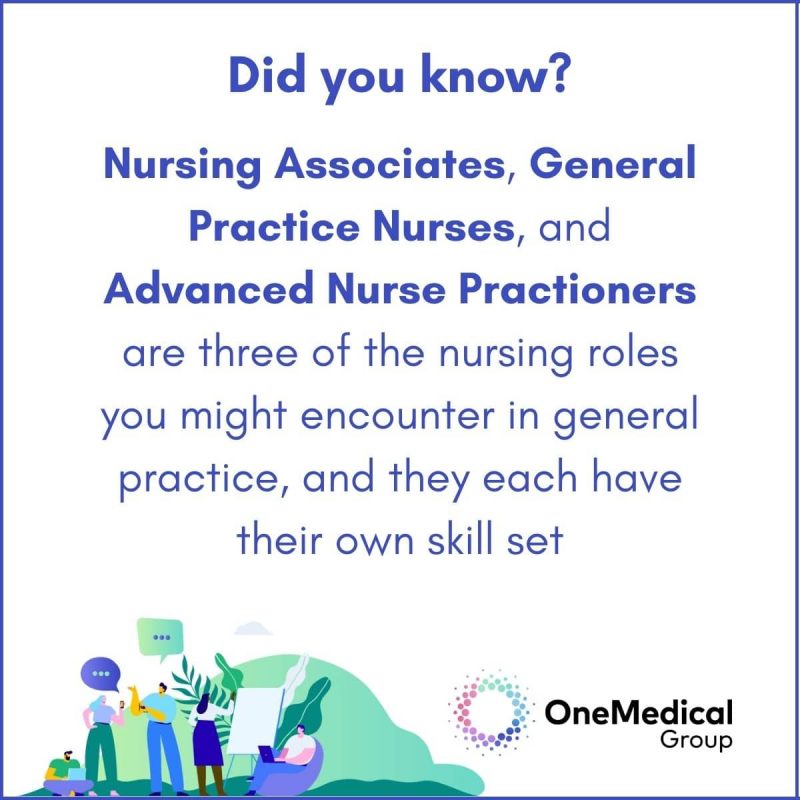
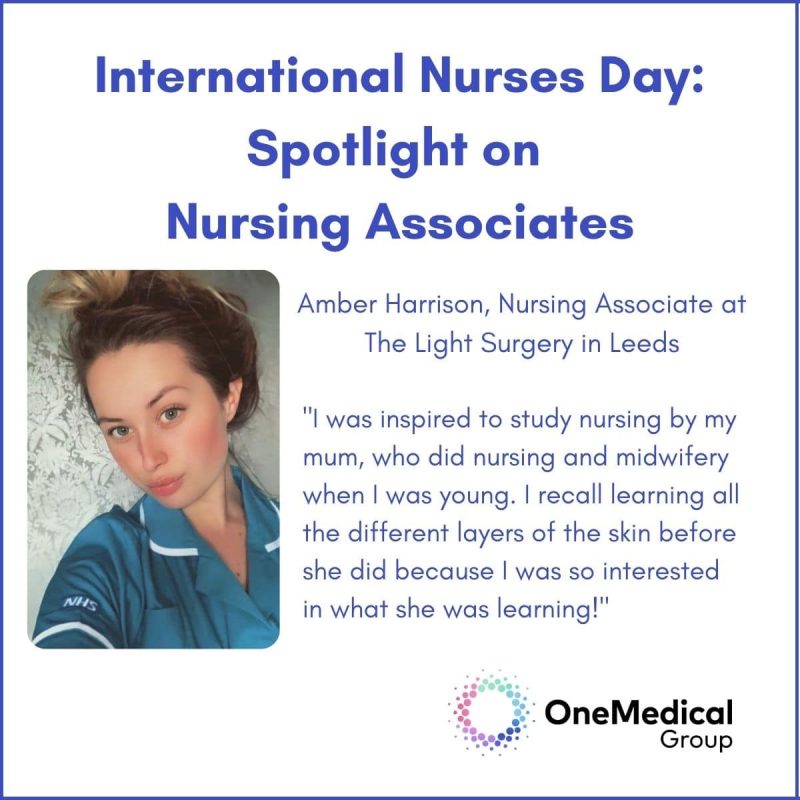
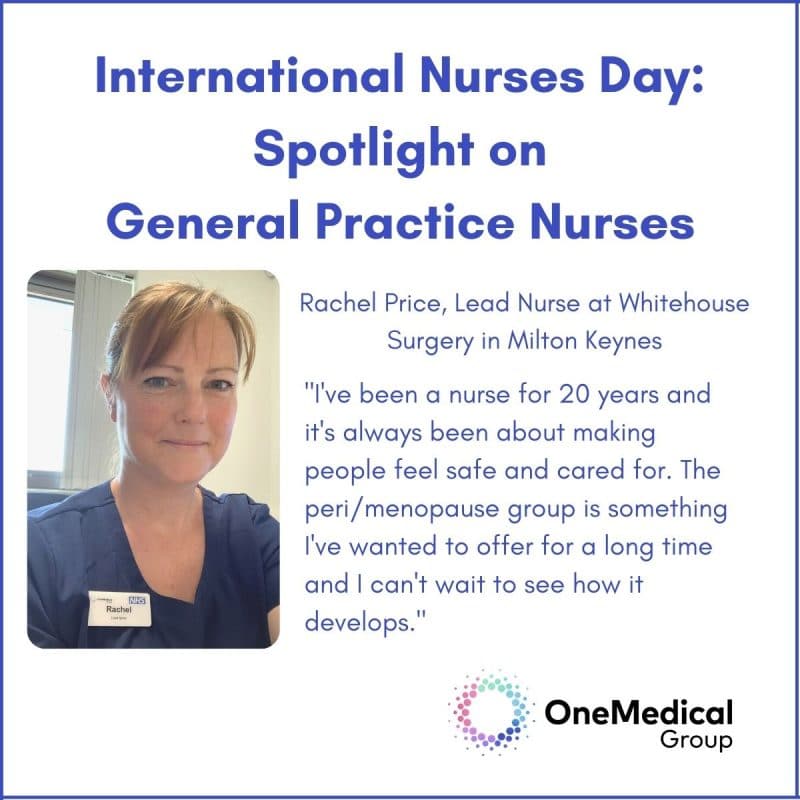
Across our OneMedical Group sites, we have 76 nurses who help to care for the 2,000 patients that come through our doors each and every week. This includes Nursing Associates, General Practice Nurses, and Advanced Nurse Practitioners. In this article, we’ll focus on these 3 nurse roles, and what each one does.

Nursing Associates
Nursing Associate is a new role, which is a stepping stone for individuals to move from a Healthcare Support Worker role to become a registered nurse. Nursing Associates work across all four fields of nursing: adult, children’s, mental health, and learning disability.
Did you know… Nursing associates can give advice about healthy lifestyles, and support you and your family through difficult diagnoses?
A nursing associate will complete two years of training, including classroom learning and hands-on experience in the workplace. They are qualified with a foundation degree. At a GP surgery, nursing associates perform a range of services including:
• Taking blood samples
• Carrying out electrocardiograms (ECGs) to check heart rhythm
• Height, weight, and BMI checks
• Lifestyle advice
• Blood pressure checks
• Wound care
• Measuring and interpreting blood glucose levels
• Effectively sharing information and checking understanding about long term conditions
• Supporting patients and their families through unwelcome news and lifechanging diagnoses
Amber Harrison works as a Nursing Associate at The Light Surgery in Leeds. She was inspired to become a Nursing Associate after seeing her mum studying nursing and midwifery at university when she was a child: “My role gets confused a lot with healthcare assistant. Although I don’t mind, it would benefit a lot of people to know the difference, so they can get booked in with the right person first time.”
General Practice Nurse
Most people have had an appointment with a General Practice Nurse at some point. General Practice Nurses are involved in many aspects of patient care, including:
• Minor and complex wound management including leg ulcers
• Travel health advice and vaccinations
• Child immunisations and advice
• Women’s health including cervical screening
• Men’s health screening
• Sexual health services and contraception
• Supporting people to stop smoking
• Long term condition screening and management
• Health promotion and healthy lifestyles advice
Did you know… that General Practice Nurses usually lead on long term condition management within GP surgeries?
Long term condition management is a crucial part of a General Practice Nurse’s duties, including asthma, heart disease, and diabetes clinics. Margaret Sykes, Practice Nurse at Westgate Surgery, chose nursing so she could work with a variety of patients in a wide range of clinical settings and locations. “Every day I am proud to be a nurse, whether immunising patients against diseases, encouraging and supporting women having a cervical smear, showing empathy for patients undergoing treatment for cancer, or supporting relatives when their loved one’s health is deteriorating.”
General Practice Nurses are proactive, working collaboratively with other individuals in multi-disciplinary team. Rachel Price, Lead Nurse at Whitehouse Surgery, worked with her local wellbeing team to set up a peri/menopause group, after hearing from people at cervical screenings that they wanted to know more. “Getting people in for smears highlighted the vast number of women wanting a safe space to talk to meet others going through what can be a really difficult and ignored stage of life.”
Advanced Nurse Practitioner (ANP)
ANPs typically manage the complete clinical care for their patient, not solely a specific condition. ANPs can make professionally autonomous decisions, for which they are accountable.
ANPs are a key part of the care offered by multi-professional teams. In primary care, ANPs can deal with most patients requesting acute, same-day appointments that do not require GP contact. This allows GPs to see patients with the most complex health needs.
Did you know… that Advanced Nurse Practitioners can diagnose patients and prescribe medication?
The main roles of a ANP include:
• Receiving and treating patients with undiagnosed problems
• Prescribing medication based on advanced assessments and physical examinations
• Screening for disease risk factors and early signs of illness
• Making differential diagnoses using decision making and problem-solving skills
• Co-developing ongoing nursing care plans for patients and with patients
• Ordering necessary investigations and make referrals to secondary care
• Supporting patients to manage and live with illness
• Working collaboratively with other healthcare professionals and disciplines
• Providing leadership and consultancy
ANPs improve the efficiency of primary care whilst maintaining high quality care and patient satisfaction.
The Role of Nurses in General Practice
Most people think only of GPs when they think of general practice. However, nurses have a key role to play in primary care, and can perform a wide range of duties. Next time you make an appointment at your GP surgery, why not consider whether a nurse could help you?





